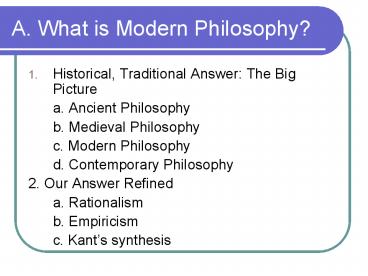A. What is Modern Philosophy - PowerPoint PPT Presentation
1 / 8
Title:
A. What is Modern Philosophy
Description:
Philosophical view that all knowledge comes from reason. A priori, innate truths and ... Scholasticism vs. Modernism. Systematically static, Aristotelianism ... – PowerPoint PPT presentation
Number of Views:3762
Avg rating:3.0/5.0
Title: A. What is Modern Philosophy
1
A. What is Modern Philosophy?
- Historical, Traditional Answer The Big Picture
- a. Ancient Philosophy
- b. Medieval Philosophy
- c. Modern Philosophy
- d. Contemporary Philosophy
- 2. Our Answer Refined
- a. Rationalism
- b. Empiricism
- c. Kants synthesis
2
Rationalism vs. Empiricism
- Philosophical view that all knowledge comes from
reason - A priori, innate truths and principles
- Deductive system
- Certain knowledge
- Philosophical view that all knowledge comes from
experience - A posteriori truths and principles
- Inductively based knowledge
- Probable knowledge
3
B. Principal Concerns of Modern Philosophers
- Epistemology
- a. Problem of foundation of knowledge
- b. Problem of certainty
- c. Status of ideas (objects of knowledge)
- 2. Metaphysics
- 1. Problem of Gods existence
- 2. Problem of existence of world
- 3. Problem of other minds
4
C. Approaches for Reading
- Strategies
- PQRST
- Inspectional, Analytic, and Syntoptic
- Spirits
- Seriousness Great for their Truths
- Playfulness Great for their errors
- Seriousness Playfulness Great for their
questions, interesting for their answers
5
D. BackgroundScholasticism vs. Modernism
- Systematically static, Aristotelianism
- University professors, dominated by Church
- Commentaries on old truths
- Theocentric
- Latin
- Systems flourished
- Independent, free thinkers, outside of schools
- Original Treatises, new truths
- Human-centered
- vernacular
6
E. Background (2) Revival of Skepticism
- Michel de Montaigne (1533-1592)
- Essays (1580, 1588) Que sais-je?
- Exalts weakness of human minds rather than
strength - Incapacity of attaining absolute truth in a
certain metaphysical system. - The proof lies in the fact that the systems are
so different.
7
E. Background (1) Rise of Scientific Method
- Francis Bacon (1561-1626)
- a. Novum Organum (New Organ, 1620)
- b. Principle of Induction
- c. Knowledge is power
- d. The Four Idols
- 2. Galileo Galilei (1564-1642)
- a. Dialogue Concerning the Two Chief World
Systems (1632) - b. Corpuscularianism
- c. Laws of nature expressed in universal
mathematical form
8
Timeline of Modern Philosophers
- http//www.timelineindex.com/content/select/91/912
,91?pageNum_rsSite1totalRows_rsSite67 - http//www.wadsworth.com/philosophy_d/special_feat
ures/timeline/enl_timeline.html - http//www.intute.ac.uk/artsandhumanities/timeline
_Philosophy.html - http//librivox.org/newcatalog/

